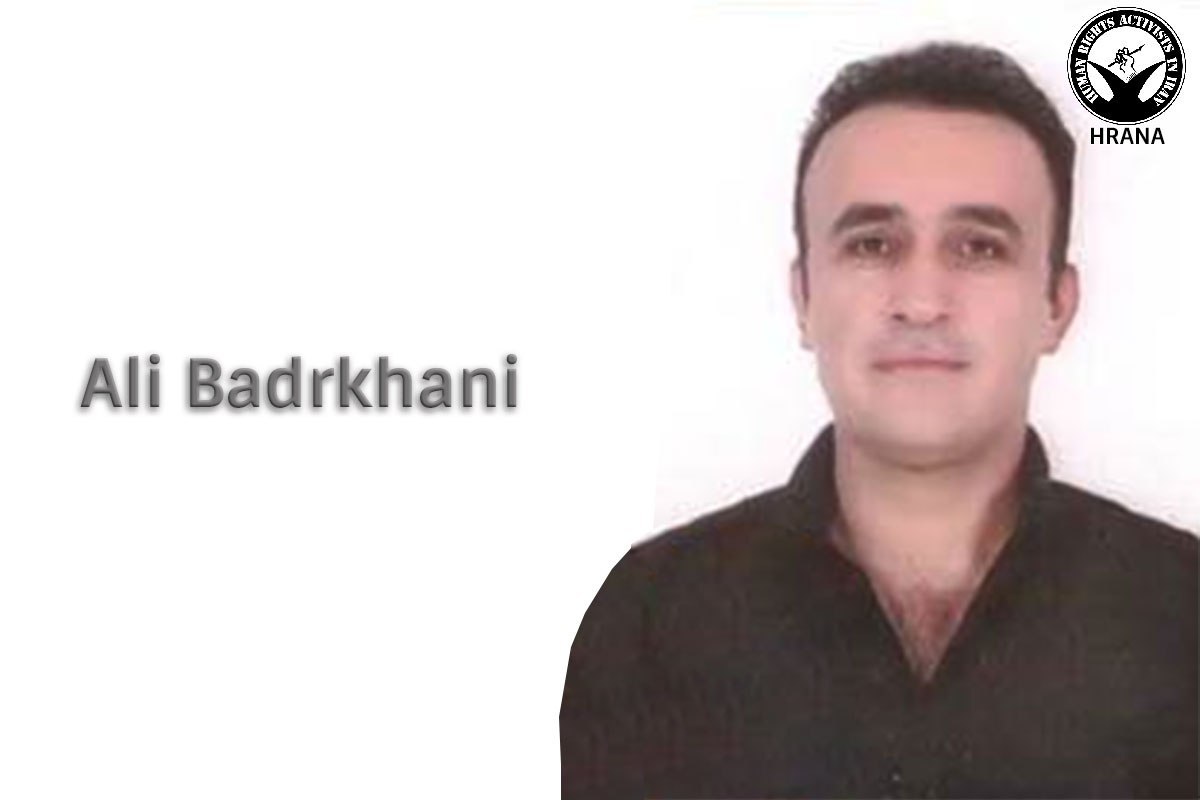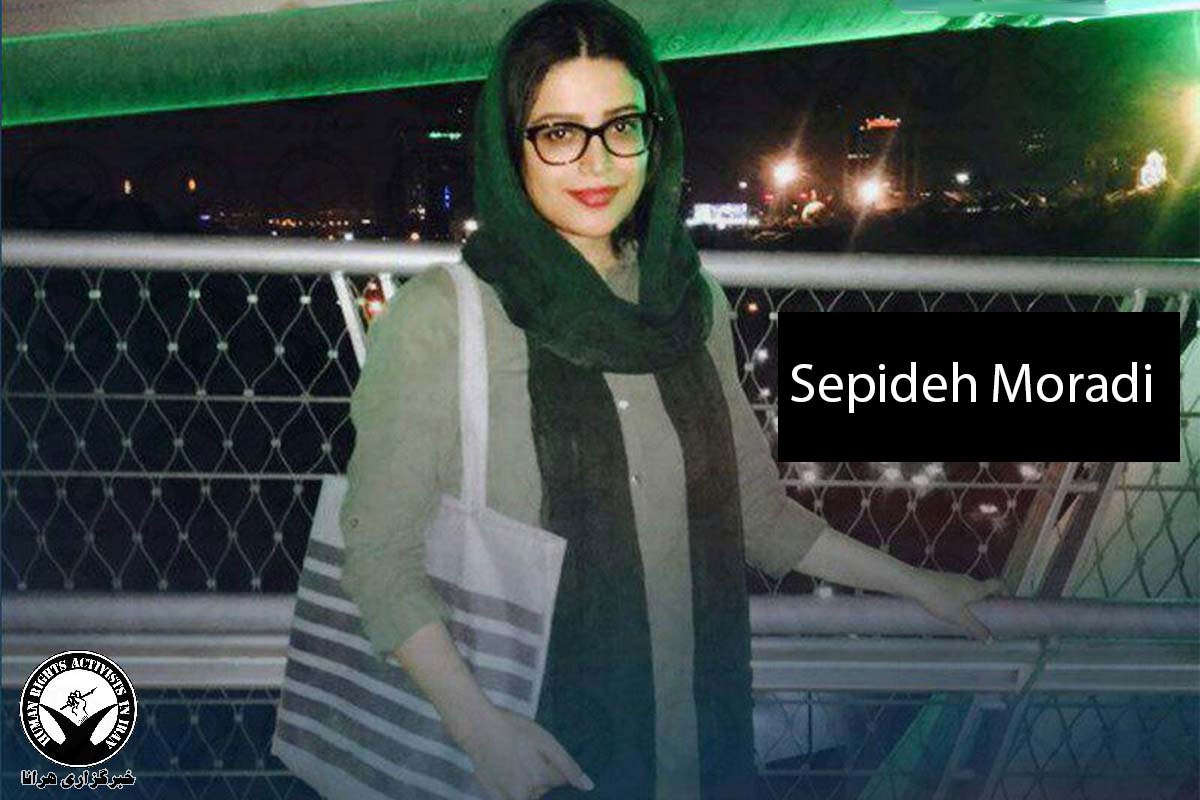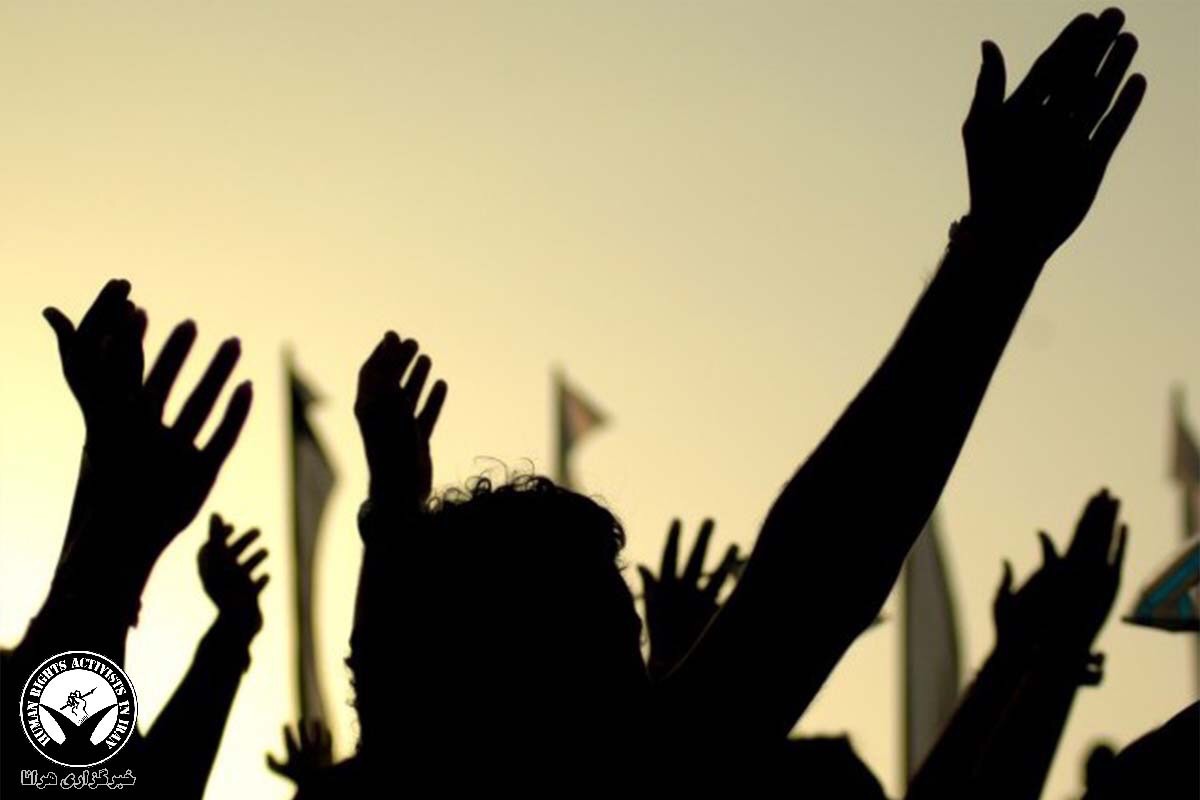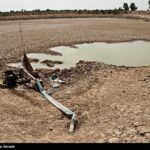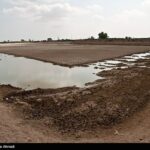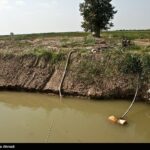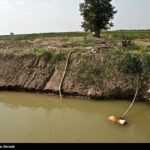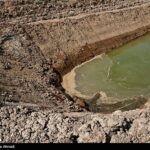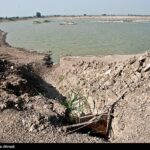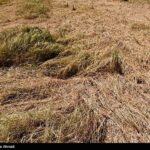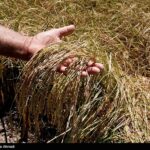Human Rights Activists News Agency (HRANA) – Ali Badrkhani, a prisoner of conscience detained in Urmia’s central prison (northwestern Iran), has been on hunger strike since Tuesday, August 7, 2018. Mr Badrkhani is protesting his transfer to a ward in the prison where 400 narcotics prisoners are held. Mr Badrkhani deems the transfer a violation of the principle of classification of the inmates based on the type of the offences.
A source told HRANA: “[Mr Badrkhani] launched the hunger strike right after his arrest to demand his transfer to the ward of political prisoners. Subsequently, the guards took him to the Prison Director’s office under the pretext of discussing his demands. However, once in the director’s office, he was handcuffed and forcibly transferred to the narcotics ward where he is currently held.” Consequently, Mr Badrkhani went on hunger strike again. Harassment due to the political nature of his charges by a prison official called Gharebaghi is reportedly another reason for his hunger strike.
Mr Badrkhani was previously arrested in winter 2015 and later released on bail. However, he was barred from continuing his education while in his last semester of completing his master’s program at the University of Tehran. He was sentenced to three years in prison for “Acting against national security”. Mr Badrkhani began srving his sentence in spring 2017.
Mr Badrkhani is a member of the Kurdish ethnic minority and has Irani-Iraqi citizenship. Among his publications are “Turkey, Democracy and Kurds”, ”Discussion of Idea”, ”Refugee of Love”, ”Kurdish Tales and Myths”
Author: admin-hr
Council for Coordination of Teaching Syndicates in Uproar over Arrest of Mohammad Habibi
Human Rights Activists News Agency (HRANA) – The Council for Coordination of Teaching Syndicates (The Council here forth) has issued a statement protesting the sentence imposed on Mohammad Habibi, a teacher’s union activist. The Council has cited the verdict as an example on which to evaluate judicial fairness in Iran. The Council has also demanded the immediate and unconditional release of Mr Habibi, adding: “The judge’s ulterior motive in this verdict is to send a warning to society: if you pursue justice, you will face prison and lashings.”
The full text of the statement has been translated to English by HRANA:
Ninety days have passed since the unlawful and violent arrest of Mr Mohammad Habibi, a member of the board of directors of the Teachers’ Union Association of the Province of Tehran. The arrest has appalled teachers and society at large, and the move is widely condemned by conscientious people after another.
Each element of Mr Habibi’s story, from the way he was arrested on May 10th to the legal process he went through and location in which he was detained, is evidence of an extrajudicial will to impose on this jailed teacher an unlawful ordeal. The denial of his bail, as well as the request from the IRGC Intelligence unit to unlawfully transfer him to Tehran, demonstrate a lack of due process and an infringement on the rights of the accused. Sadly, his story doesn’t end there. Mr Habibi was also denied urgently necessary medical attention. Coupled with the deplorable conditions of the Great Tehran Penitentiary, such negligence could end in tragedy if the status quo persists.
Based on reliable information obtained by the Council, the family of Mr Habibi has stopped at nothing to fight for his rights. They have pursued his case by writing letters and visiting with officials in person. Thanks to their efforts, it can be said with certainty that authorities on the highest level are aware of the appalling situation Mr Mohammad Habibi is in. They know of the distress that Mr Habibi’s ordeal has inflicted on the Iranian teaching community. Nevertheless, in an unprecedented and unjust verdict from Judge Ahmadizadeh who presides over Branch 26 of the [Tehran] Revolutionary Court, Habibi was sentenced to ten and a half years in prison, two years’ ban on his social activities, a two-year travel ban, and to crack down even harder, 74 lashings.
It is as if the judge intended with his verdict to put society on guard, sending the message that if you pursue justice, you will face prison and lashings. It is as if the judge sought to say to those oppressed, frustrated, and fed-up with corruption and rising prices, that authorities won’t lay a hand on thieves or embezzlers, and seek only to imprison people, especially teachers, who fight for freedom and justice.
In our view, these due process violations are so stark that an investigation into Mohammad Habibi’s ordeal could provide a clear measure of the judiciary’s integrity.
Therefore, we ask independent jurists and legal experts to investigate this matter so that the Judiciary might respond to the teachers’ inquiries and concerns:
– We would like to know on what basis the agents [who came to arrest Mr Habibi] put a gun to his head while handcuffing him?
– We would like to know what or who allowed plainclothes agents to drag Mohammad Habibi on the pavement after beating him?
– We would like to know on what basis and how the investigators first set the bail, only to deny it later and send the case to the court?
– We would like to know why the judge denied the bail and returned Mr Habibi to the Great Tehran Penitentiary?
– We would like to know why Mohammad Habibi was not transferred outside of the prison for medical attention, despite the coroner’s confirmation that he needed care?
These are the unanswered questions that have preoccupied most of our minds.
Our last question is, why and how can a judge increase a punishment already imposed? The maximum penalty for collusion is five years in prison; for propaganda against the regime, one year; and one year for disturbing the public peace. The judge did not adhere to these maximums, and instead extended Habibi’s prison sentence from one and a half to ten and a half years, even though the maximum punishment for all of the charges against him could only amount to seven and a half years.
How odd a degree of hostility and rancor for those who are responsible for the education of our children.
The Council adamantly condemns the sentence of Mr Habibi and demands his immediate release until his case is heard by an appeals court. The teaching community does not abide charges against jailed activists and requests exoneration of Mr Habibi by an appeals court. We believe that the imprisonment of union activists is the epitome of treating civic activities as security threats. In a political climate like this one, with teachers confined to prison, it is futile to speak of solving education problems. Consequently, union activists, with their imprisoned colleagues in mind, will start this school year in a new, different way.
The Council for Coordination of Teaching Syndicates
August 7, 2018
****************************************
In mid-July, a group of teachers met with the Minister of Education’s advisor in Union Affairs and delivered a letter in defense of Mohammad Habibi. In the letter, the signatories expressed concerns about Mr Habibi’s health and asked for his transfer to Evin Prison.
In June, a letter signed by 6,500 teachers and civil activists demanding the release of Mr Habibi was delivered to the Iranian Parliament.
On May 10, 2018, the Council urged teachers to assemble in protest. In Tehran, several of those who responded to the call were arrested and transferred to Evin Prison, and all but Mr Habibi were released on bail three days later.
Mohammad Habibi was previously arrested and jailed for 44 days in March 2018 and was released on a bail of approximately $50,000 USD.
Women Prisoners of Conscience Write Letter of Condolence to Human Rights Lawyer
Human Rights Activists News Agency (HRANA) – Following the sudden death of Homa Soltani, the 27-year-old daughter of imprisoned human rights lawyer Abdolfattah Soltani, a group of women prisoners of conscience in Tehran’s Evin Prison wrote a joint open letter to convey their condolences.
ENGLISH TRANSLATION
***********************************
Dear Mr Abdolfattah Soltani and Ms [Masoumeh] Dehghan [spouse of Mr Soltani and mother of Homa Soltani],
It is with great regret and sadness that we hear from our prison cells the heartbreaking news of your beloved daughter’s passing.
Enduring the pain of this loss while serving your eighth year of imprisonment will not be easy, Mr Soltani, as a bereft father and one of the most steadfast defenders of human rights and one of the most compassionate figures in this land – or for you, Ms Dehghan, a kind mother and companion and an aid to Iranian civil society.
We appreciate the scale of your suffering and bereavement. We wish patience and better days for you and your children, and demand Mr Soltani’s freedom from prison.
The list of signatories is as follows:
Nasrin Sotoudeh, Narges Mohammadi, Atena Daemi, Maryam Akbari Monfared, Azita Rafizadeh, Sima Kiani, Nazanin Zaghari and Negin Ghadamian.
***********************************
Abdolfatah Soltani was granted furlough to attend the funeral of his daughter, Homa Soltani, who died on August 3, 2018, at the age of 27 as a result of a heart attack.
Amnesty International issued a statement on Twitter in reaction to Homa Soltani’s death, and citing the human rights activities of Mr Soltani, asked “How much longer will Abdolfattah Soltani and his family be punished for defending human rights? The Iranian authorities must put an end to this injustice and release Abdolfattah Soltani immediately”.
On Sunday, August 5, 2018, Saeed Dehghan, Mr Soltani’s lawyer, wrote a letter to Iranian President, Hassan Rouhani, citing the reason behind the arrest of his client was politically motivated and orchestrated by individuals such as Saeed Mortazavi (former Tehran Prosecutor General and Iran’s Prosecutor General Assistant who has been convicted of abetting the murder of a jailed protestor during the 2009 popular unrest. He has been sentenced to two years in prison). Mr Dehghan requested from Mr Rouhani to observe the law regarding the conditional release of his client.
Baha’i Student Jailed to Serve his Sentence
Human Rights Activist News Agency (HRANA)- Mehran Eslami Amirabadi, Yazd native and member of the Baha’i religious minority, has turned himself in to serve an 18-month jail term, 12 months of which must be served in exile in Saravan (located in Sistan & Baluchestan, a southeastern province known for extreme heat, drought, and few natural resources).
A source close to Eslami confirmed the news to HRANA, adding that he decided to turn himself in upon the detainment of his co-defendant Mehran Bandi Amirabadi, who is subject to the same sentence.
Five others who were tried in the same court face a 3-year suspended prison sentence: Sorour Foroughi Mehdi Abadi, Farzad Rouhani Monshadi, Ramin Hosri Sharaf Abadi, Mohammad Ali Tadrisi, Ahmad Jafari Naimi.
Along with several other Baha’is, Eslami was tried several months ago in Branch 3 of Yazd Provincial Appeals Court on the charges of “disseminating propaganda against the regime” and “propaganda on behalf of groups or organizations acting against the regime.” All were sentenced in that trial to one year in prison, and a one-year suspended prison sentence. Given this prior sentence, Eslami will likely spend a year and a half behind bars.
Baha’i citizens of Iran are systematically deprived of religious freedoms, while according to Article 18 of the Universal Declaration of Human Rights and Article 18 of the International Covenant on Civil and Political Rights, all people are entitled to freedom of religion, belief, and changes thereof, as well as the right to express and practice those beliefs as individuals or collectives, in public or in private.
Though unofficial sources estimate the Baha’i population of Iran at more than 300,000, Iran’s Constitution officially recognizes only Islam, Christianity, Judaism, and Zoroastrianism, and does not acknowledge the Baha’i faith as an official religion. As a result, the rights of Baha’is in Iran are systematically violated.
Christian Convert Couple in Bushehr Face Prison Sentence
Human Rights Activists News Agency (HRANA) – The Revolutionary Court of Bushehr has ruled to sentence Christian converts Shapour Jozi and his wife, Parastou Zariftash, to one year in prison.
Jozi and Zariftash are among a group of Christian converts residing in Bushehr (capital of the southern province of Bandar Abbas) who were arrested in 2015, and among the 12 of whom were accused of “propaganda against the regime” for founding Christian churches in local homes. So began a 2-year deliberation in the Revolutionary Court of Bushehr that would finally convict Jozi, Zariftash, and their ten comrades to one year of imprisonment each.
Jozi and Zariftash told Mohabbat News: “Judge Abbas Asgari, the head of Branch 1 of the [Bushehr] Revolutionary Court, accused us of propaganda against the regime by way of Christian Zionism, because we gathered in family circles, inviting people to Christianity and drawing them to the land of Christianity*.”
The charge of “drawing people to the *land of Christianity” is unprecedented in Iran, making their case particularly noteworthy.
Jozi added, “The verdicts say that a number of books, booklets, publications, CDs, banners, Bibles, sermons, group prayers, and invocation books bearing the sign of the cross, computers, Christian paintings, USBs, tablets, cell phones, and statues have been discovered and confiscated by the government.”
Despite promises from Iranian president Hassan Rouhani, a self-proclaimed moderate, to increase government tolerance in view of rights to religious freedom, Christians have recently faced considerably mounting pressure from authorities.
“The Iranian people enjoy few, if any, freedoms, least of all the freedom of religion,” Mike Pence, Vice President of the United States, recently said.
“Christians, Jews, Sunnis, Baha’is, and other minority religious groups are denied the most basic rights enjoyed by the Shia majority, and they are routinely fined, flogged, arrested, assaulted, and even killed.”
In reference to the same issue at a gathering of Iranian-Americans in Los Angeles, Secretary of State Mike Pompeo also affirmed that the Iranian authorities violate the rights of religious minorities.
*With “the land of Christianity,” Iranian authorities are likely referring to Jerusalem.
Summary Report: Recent Arrests, Imprisonment and Executions
Human Rights Activists News Agency (HRANA) – A summary report on the most recent news of arrests, imprisonment, and executions in Iran from the the last week of July 2018 to August 7, 2018.
Iraj Mohammadi and Mohammad Amin Agoushi Released from Tabriz Prison 
Political prisoners Iraj Mohammadi and Mohammad Amin Agoushi were released from Tabriz Prison on Sunday, August 5, 2018, following the end of their judicial sentence. In September 2007, Mr Mohammadi and Mr Amin Agoushi were sentenced to a 10-year prison exile term each on the charge of “Acting against national security”.
Last week, HRANA reported on a hunger strike launched by Iraj Mohammadi in objection to the Iranian authorities preventing his release from prison despite reaching the end of his conviction.
Iranian authorities arrested Mohammad Amin Agoushi on September 23, 2007, on the charges of “Espionage” and “Cooperation with Iraqi Kurdistan”. In May 2008, branch 2 of the military court in Urmia charged him with “Moharebeh” (enmity against God) and transferred him to Urmia’s central prison. Four months later, Judge Hafiz Ghaffari sentenced him to death by a firing squad.
In 2010 the retrial request was approved and the case was sent to branch 31 of Iran’s Supreme Court where the sentence was reduced to ten years in prison exile. Iraj Mohammadi and Mohammad Amin Agoushi were transferred to Tabriz Prison from Zahedan in March.
In February 2017 Iraj Mohammadi explained some points in an open letter about rejecting his request for amnesty. Mr Mohammadi emphasized that the mentioned reasons were false, stating that he suffered from nervous and mental illnesses as a result of being held in solitary confinement for eight months and tortured at the onset of his arrest.
Sunni Prisoner Yasser Sharafipour Suffers from Medical Neglect
On Friday, August 3, 2018, the chest, abdomen and back of Yaser Sharafipoor, a Sunni prisoner in Karaj’s Rajai Shahr Prison, was burned with hot water.
An informed source told HRANA: “The burn was so severe that he had difficulty breathing. Prison authorities transferred him to the clinic but they only used burn ointment and returned him to the ward. When the prisoner protested, they sent him to the hospital with handcuffs and shackles. Despite the recommendation of the doctors to hospitalize him, he was returned to the prison.
Arraignment of Kamal Abdollahi in Urmia Court
Kamal Abdollahi, a citizen from Piranshahr who is held in Urmia’s central prison, was charged with “Acting against national security” by branch 6 of the Urmia Revolutionary Court on Wednesday, August 1, 2018. No information was given to Mr Abdollahi regarding the reason for the charge.
Iranian authorities arrested Mr Abdollahi on May 5, 2018, and held him for three months in a detention center operated by the Ministry of Intelligence in Urmia.
Five members of the Syndicate of Workers of Tehran and Suburbs Bus Company Arrested
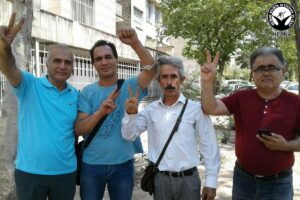
On the morning of August 5, 2018, drivers of the United Bus Company of Tehran went to the company’s offices to track their housing situation in connection with issues such as the lack of delivery of housing to members despite paying all the agreed amounts in the contract. When they arrived, they were not allowed to enter, which sparked a protest that was cracked down by police forces. During the crackdown, five members of the Syndicate of Workers of Tehran and Suburbs Bus Company were arrested. The individuals are Hassan Saeedi, Davood Razavi, Atta Babakhani, Ali Ghorbanian and an unidentified person.
A close source tells HRANA: “Their detention was a result of a request by Mr Sanandaji, the President of the company. Members of the Syndicate of Workers of Tehran and Suburbs Bus Company gathered in front of branch 4 of Tehran’s security offices to support their detained colleagues until their release.”
The five workers were reportedly released hours after they were detained.
Intelligence Agents Arrest Young Man from Zarabad
According to HRANA’s sources and the Baloch Activists Campaign, a 35-year-old man by the name of Abdul Latif Miran Zehi was arrested by Intelligence agents on August 2, 2018, and transferred to Chabahar Prison.
An informed source said: “Abdul Latif Miran Zehi was getting his hair cut at a salon in Zarabad when he was arrested, handcuffed and taken by Intelligence agents who did not present an arrest warrant.”
No information about the reason for his arrest is available at this time and Mr Miran Zehi’s family is unaware of his condition following his arrest.
On May 25, 2018, a 23-year-old man by the name of Abdul Ghani Miran Zehi was arrested by Intelligence agents.
Gonabadi Dervish Maryam Farsiyabi Sentenced to Six Months in Prison
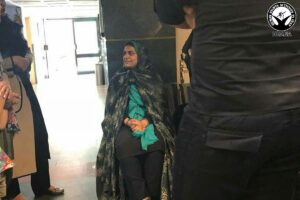
According to close sources and the Sufi news website Majzooban-e Noor, Maryam Farsiyabi, a Gonabadi Dervish, who is detained in Charchak Prison in Varamin, was sentenced to six months in prison and a two-year travel ban by branch 15 of the Tehran Revolutionary Court.
Ms Farsiyabi was arrested on February 20, 2018, during the “Golestan 7th Avenue Event” which she attended with her husband, Mohammad Karimayee, and hundreds of other Gonabadi Dervishes.
Ms Farsiyabi was beaten by Iranian authorities to the point that she suffered from a fracture to her hand and her jaw was dislocated.
Mr Karimayee was recently sentenced to seven years in prison by the Tehran Revolutionary Court.
Maryam Farsiyabi, along with other women Dervish prisoners, launched a hunger strike on June 15, 2018, in protest of a violent attack by the guards. They ended their hunger strike on June 30, 2018.
Mohammad Mozaffari lashed 74 times in Evin Prison

The 74 lashings sentence for Mohammad Mozaffari was reportedly carried out in Evin Prison on Sunday, August 5, 2018. Mr Mozaffari is a political activist who was sentenced to two years in prison, 74 lashes and a 20,000,000 Rial [approximately $200 USD] fine on the charge of “Propaganda against the regime”. The sentence was issued by Abolqasem Salavati, a judge in branch 15 of the Tehran Revolutionary Court.
On June 18, 2018, Mohammad Mozaffari was sent to Evin Prison to serve his two-year sentence.
Mr Mozaffari’s lawyers objected to his judicial sentence and the case was referred to the appeals court. Mr Mozaffari’s sentence was upheld by branch 36 of the Tehran Appeals Court.
Four prisoners were executed in Minab and Bandar Abbas
Iranian official sources have reported on the execution of three prisoners in Minab Prison on rape charges. The executions were reportedly carried out on the morning of Wednesday, August 8, 2018. According to an Iranian state-run news agency, the unidentified prisoners were accused of kidnapping and raping a woman in 2016 in the city of Minab.
Minab is one of the eastern cities of the Hormozgan province in southern Iran.
Prisoner at Bandar Abbas Central Prison Executed
On the morning of Tuesday, August 7, 2018, a prisoner convicted of “Murder” was reportedly executed in Bandar Abbas’s central prison. The prisoner, who has been identified as 46-year-old Amir Ali Kolivand, was arrested in June 2014.
Mr Kolivand was transferred from Haji Abad Prison to Bandar Abbas’s central prison on Monday, August 6. Haji Abad is the northernmost city of the Hormozgan province and is located near the Kerman province.
Regarding Mr Kolivand’s case, an informed told HRANA: “Amir Ali Kolivand was also charged with trafficking 5 kilograms of crystal meth, but he was executed on the charge of killing a bus driver.”
Mr Kolivand’s execution has not been announced by Iranian official sources.
According to Amnesty International’s annual report, Iran, in proportion to population per capita and executions, ranks first in the world in executions.
An annual report published by the Center of Statistics at Human Rights Activists in Iran (HRAI) states that more than 60% of executions in Iran are not reported by the state or the Judiciary. These executions are considered “secret executions”.
According to registered data from 2,945 reports by the Statistics, Publications and Achievements Division of HRAI, in the past year (from March 21, 2017, to March 18, 2018), at least 322 citizens were executed and 236 others were sentenced to death in Iran. Among these, there was the execution of four juvenile offenders and 23 public hangings.
Baha’i Citizen in Yazd Arrested
Mehran Bandi Amirabadi, a Bahai citizen, was arrested without a warrant by security forces on Tuesday, August 7, 2018, in the city of Yazd (conservative religious capital of the Yazd province).
A close source confirmed the news and told HRANA: “At noon, security forces arrested Mehran Bandi Amirabadi at his workplace.”
Mr Amirabadi was tried with six other Bahai citizens in branch 3 of the Yazd Appeals Court. Mr Amirabadi was sentenced to one and a half years in prison and one year in exile in Divandareh (a remote city in the Kurdistan province).
Iranian Baha’i citizens are systematically deprived of religious freedoms, while according to Article 18 of the Universal Declaration of Human Rights and Article 18 of the International Covenant on Civil and Political Rights, everyone is entitled to the right to freedom of religion and belief, and the right to adopt and manifest the religion of their choice either individually, in public or in private.
Based on unofficial sources, more than 300,000 Baha’is live in Iran. However, Iran’s Constitution only recognizes Islam, Christianity, Judaism, and Zoroastrianism and denies recognizing the Baha’i faith as an official religion. Consequently, the rights of Baha’is are systematically violated in Iran.
Political Activist Mokhtar Zarei Temporarily Released from Prison

According to close sources and the Kurdistan Center for Democracy and Human Rights, political prisoner Mokhtar Zarei was temporarily released on bail from Sanandaj Prison on Tuesday, August 7, 2018, after 17 days of detention.
Mr Zarei was reportedly arrested on Saturday, July 23, 2018, and summoned to court.
A few days before his arrest, Mr Zarei claimed the reason for his arrest is his criticisms against Ali Khamenei, the Supreme Leader of Iran, and the human rights violations in Iran.
Environmental Activist Yousef Farhadi Babadi Summoned to Court

Environmental activist Yousef Farhadi Babadi was reportedly summoned to branch 118 of the Isfahan Criminal Court regarding Dr Abedi’s (parliament representative of Isfahan) lawsuit. Mr Babadi was released on bail from Isfahan prison on March 12, 2018.
On March 5, 2018, Mr Babadi received a subpoena and a call from the Chaharmahal and Bakhtiari Province’s prosecutor’s office regarding his publication in a social media channel called “Sound of Water”, which mainly criticized the water situation in Iran. This subpoena was issued to him based on the charge of “Disseminating lies and disturbing public opinion in cyberspace”.
A Civil Rights Activist in Marivan and Two Others in Oshnavieh Arrested by Intelligence Agents, Transferred to Unknown Location
According to close sources and the Kurdistan Center for Democracy and Human Rights, in the last week of July 2018, Marivan intelligence agents arrested Arman Ghafouri, civil rights and environmental activist, and transferred him to an undisclosed location. Mr Ghafouri’s family has not been able to obtain any precise information about the reason for his arrest or the location where he is being held.
Previously, Armin Ghafouri and eight other civil rights activists were arrested on March 12, 2018, and interrogated by Iranian authorities regarding their participation in a gathering condemning the “Turkish military operation of Afrin”. army’s attack on the Afrin city”. They were subsequently released on bail.
During the past few days, Kamel Ahmadi and Tayyeb Bamorovat were arrested by Intelligence agents for the charge of “Cooperation with a Kurdish opposition party” and transferred to an unknown location. A total of seven citizens from Oshnavieh have been arrested for the same charge and the identity of only five of them has been identified thus far.
Open Letter: Arash Sadeghi Sounds Alarm of Renewed Assassination Campaign
Human Rights Activists News Agency (HRANA) – From Karaj’s Rajai Shahr Prison, civil rights activist Arash Sadeghi has written an open letter in response to the assassination of Eqbal Moradi, an Iraqi Kurdistan political activist and the father of political prisoner Zanyar Moradi. In his letter, Sadeghi traces the domestic and foreign assassination campaigns that Iran has been orchestrating since February 1979.
As previously reported by HRANA, the dead body of Eqbal Moradi was found near the Iran-Iraq border in Penjwen, Iraqi Kurdistan. The three bullet wounds on his body marked the last of many attempts on his life.
The full text of Sadeghi’s letter, translated into English by HRANA, is below:
“The campaign to eliminate critics inside and outside the country started in the month of February 1979. It claimed the lives of hundreds of people associated with the previous regime, in addition to Sunnis, Baha’is, dissidents, and members of revolutionary political groups that challenged the new regime’s leadership. It continued during the vast oppression of the 1980’s, and with the mass murder of political prisoners in the Summer of 1988. After the [Iran/Iraq] war ended, it continued with a string of assassinations (known as ‘Chain Murders’) targeting the regime’s detractors and opponents.
Many names can be found on the blacklist: Mohammad Mokhtari, Dariush Forouhar, Parvaneh Eskandari, Mohammad Jafar Pooyandeh, Ali Akbar Sirjani, Pirooz Davani, Hamid and Karoon Hajizadeh, Masoumeh Mossadegh, Zohreh Izadi, and dozens of other dissidents.
But assassinations didn’t reserve themselves for critics and dissidents within Iran. In the past four decades, they followed dozens of opposition figures to European countries.
Ashraf Pahlavi’s son Shahriar Shafiq was the first to go down, killed in Paris in December of 1979. He had been convicted in absentia of “corruption on earth” [a capital crime in Iran] by Sadeq Khalkhali [a notorious judge of the early revolutionary period].
Abdul Rahman Ghassemlou and Abdollah Ghaderi were assassinated in Vienna, Austria during a negotiation with diplomats of the Islamic Republic.
Gholam Keshavarz was killed in Cyprus; Sedigh Kamangar in Ranya, Iraq; and Kazem Rajavi in Switzerland.
Efat Ghazi [spouse of a prominent Kurdish activist and daughter of the President of Iran’s ephemeral Republic of Mahabad] was assassinated in Vasteras, Sweden.
Abdolrahman Boroumand and Shapour Bakhtiar were killed in France.
Fereydoun Farrokhzad was assassinated in Bonn, Germany.
Mohammad Sadegh Sharafkandi, Fattah Abdoli, Homayoun Ardalan, and Noori Dehkordi were assassinated in a restaurant called Mykonos in Berlin. Then there was the bombing of the Jewish community center in Argentina…
Based on the statements of German prosecutors, the foreign-soil murders — right up to the Mykonos killings — were led by the [Iranian] regime’s top political figures. And it was only after trial, and the diplomatic crisis with European countries, that the assassination campaign came to a brief pause.
The chain murders came right behind the 1988 [mass] executions. It was only in the Khatami era, with its relatively open media atmosphere, that the public was sensitized to these murders. Ultimately it was declared that the assassinations were the work of high-ranking security officials, chiefly Saeed Emami. From the autumn of 1998, the murders carried on into the early 2000’s.
The overseas assassination campaign is back up and running; once again the alarm bell is sounding, and the campaign is accelerating forward.
This time around, they targeted Eqbal Moradi. We heard the shocking and bitter news of Eqbal’s death – he is the father of Zanyar Moradi, a political prisoner sentenced to death. [Eqbal] Moradi was an active human rights defender in the city of Penjwen. He collaborated with several human rights organizations, including the international “No To Executions” campaign, and raised funds for political prisoners and their families.
Rare is the human rights activist who hasn’t heard of Eqbal Moradi. I got to know him years ago, and I saw what he did for his dear son, his nephew (Loghman Moradi), and for all political prisoners. When Zanyar was 19 he was taken hostage with his cousin Loghman, simply because the Iranian security apparatus held a grudge against his father.
Zanyar and Loqman were sentenced to die without a fair trial. It’s now been ten years since they’ve been in prison. A flagrant injustice in the trial of Zanyar (a man I consider to be a symbol of resistance and honor): when witnesses were ready to attest to both [him and his cousin’s] innocence, the judge — who is but a rubber-stamp for the security apparatus — refused to accept their testimonies, without giving any legal reasons.
A flagrant injustice: they are hostages to a sinister plot of the security apparatus. Now the father is gone, and his death sounds the alarm of a renewed assassination campaign through Iraqi Kurdistan.
Make no mistake, the renewal of the assignation campaign in Iraqi Kurdistan would be rooted in the regime’s grudge against the opposition; they see the elimination of critics as legitimate, an expedient protection of the regime and of religious law. In the past year, four more Kurdish activists have been assassinated in Iraqi Kurdistan, in addition to Ahmad Mawlana Abu Nahez — known as Ahmad Neysi — an Ahwazi activist who was assassinated in the Netherlands.
Unfortunately, ever since the establishment of the Kurdish Regional Government (KRG), it has lacked a strong and independent government and suffered from partisan divisions. This, paired with the political-military presences in neighboring countries — especially the Islamic Republic, whose Hamzeh Base in Urmia [close to the border with Iraq] answers to the Quds Force, an operating arm of the assassination campaign abroad — has made Iraqi Kurdistan an easy target.
The silence of some countries in response to these assassination cases, or other countries’ official or unofficial endorsement of them, will empower Iran, with all of its human rights violations in-country, to eliminate dissidents abroad with greater ease.
This places a heavy burden on the officials of European countries.
In recent years, they’ve sent thousands of their own citizens to countries such as Iraq, Syria, and Afghanistan to show their commitment to fighting state-sponsored terrorism and human rights violations.
If Western officials are serious about this commitment, they cannot rightly plead economic and trade interests as an excuse to turn a blind eye to operatives of this overseas assassination campaign, the very same people who eliminate dissidents within Iran’s borders. Any kind of silence or cooperation with the Islamic Republic enables domestic oppression and threatens the opposition abroad.
Arash Sadeghi
Wednesday, August 1, 2018
Gohardasht [Rajai Shahr] Prison, Karaj
Dervish Woman Handed Prison Sentence on National Security Charges
Human Rights Activists News Agency (HRANA) When 324 members of the Dervish Muslim minority [1] were arrested February 3, 2018, Sepideh Moradi was among them. According to Human Rights Watch, a sense of injustice over intensified government surveillance of their spiritual leader prompted Moradi and her comrades to organize a protest, which flagged them as threats in the eyes of authorities.
Sure enough, Dervish news agency Majzooban Noor reported that when a detained Moradi–in protest of a lack of due process and legal representation for Dervishes–refused to attend her trial on July 28th, she was sentenced in absentia by Judge Salavati and is now beginning a five-year sentence at Gharchak Varamin Prison [2] for “Collusion to Act against National Security.”
Salavati leaned on section 23 of the Islamic Penal Code to stiffen Moradi’s sentence with two-year bans on travel, membership in political groups and parties, and media or cyber activity. She had already been barred from pursuing her master’s degree in Computer Science on a prior charge.
“The accused is the daughter of Hamidreza Moradi, an extremist figure and one of the directors of the Majzooban Noor website,” her verdict read. “She was raised in a dogmatic Dervish family, and joined the Gonabadi Dervish sect under the influence of their deviant beliefs.”
Moradi and her fellow women Dervishes reportedly endured mistreatment and torture over the course of their interrogation and detention. At one point Moradi went on hunger strike to protest a violent raid conducted June 13th by the Special Guard Force of the prison. HRANA previously published the identities of these attackers.
She received medical care from an outside facility on July 25th after weeks of follow-ups; as of the date of this report, no further information was available on her health condition.
Tehran General Prosecutor Jafari Dolatabadi announced on July 24th that 330 sentences had thus far been handed down in Dervish cases. He added: “In the cases of those 25 who refused to attend their court sessions in attempts to thwart trial proceedings, the court […] followed through with procedure. Their verdicts were delivered in person.”
[1] There are various divisions among Dervishes in Iran; those featured in this article are Nematollahi Gonabadis who consider themselves followers of Twelver Shia Islam, the official state religion in Iran. According to Human Rights Watch, Noor Ali Tabandeh, spiritual leader of the Nematollahi Gonabadi Dervish faith, published a video on March 8th stating that he is not allowed to leave his residence in Tehran.
[2] For more information on deplorable conditions in Gharchak prison, please refer to pages 18 to 20 of the following document compiled by UK Home Office:
https://assets.publishing.service.gov.uk/government/uploads/system/uploads/attachment_data/file/565834/CIG-Iran-Prison-Conditions-v1-February-2016.pdf
Protests and Marches in at Least Six Iranian Cities
Human Rights Activists News Agency (HRANA) – Throughout Sunday and Monday in Iran, multiple protests were reported across Iran. Protesters included: a group of Azadi Sports Complex workers (in Tehran), a group of Falat-e Ghare oil workers (in Khark island in the Persian Gulf), several Northeastern Railroad workers, a group of Tehran’s Shad Abad Iron Market merchants, a group of landowners in Savojbalagh (whose properties have been recently designated as a “national resource”), and a group of residents of Asr Abad village in Marivan (western Iran).
Azadi Sports Complex
According to the state-run Fars News Agency, Azadi Sports Complex workers were protesting the dismissal of six of their colleagues in addition to unpaid severance pays.
Azadi complex is under provisional direction following the sacking of its last director in July. Twenty protesting workers first gathered in Azadi Sports Complex to voice their demands and then headed to the Ministry of Sport and Youth. Following the rally in front of the Ministry, Zhaleh Faramarzian, a Ministry VP, met and spoke with a representative of the protesters. When Ms Faramarzian reportedly promised to help resolve their issues, the protestors marched to the Development and Maintenance of the Athletic Facilities Office to hold discussions with its president, Hassan Karimi.
As a result of these discussions, it was agreed that the six dismissed workers would return to work and the other demands would be met as soon as possible.
Falat-Ghareh Oil Workers Go on Strike
Workers at the Falat-Ghareh located in Khark Island in the Persian Gulf launched a strike and rallied in protest to a $50* cut to their salaries. According to the state-run Tasnim News Agency, the employer is refusing to heed to the demands of the workers.
Railroad workers continue their strike
The news website Radio Zamaneh reports on the continued strikes of railroad workers and that the North East railroad workers blocked railroad tracks to stop train services.
There are reports of continued strikes in the cities of Sarakhs, Shahroud, Damghan, and Semnan. The workers in these areas have reportedly not received their salaries, insurance, and severance pays for the past three months.
Railroad workers in Iran who number 7,000 nationally demand that temporary and contractual agreements are scrapped and replaced by permanent positions. They also ask for their unpaid salaries and benefits and seek insurance coverage [by the employer].
Iron Market Strike Continues
Radio Zamaneh reports that for the second day in a row, merchants at Tehran’s Shad Abad Iron Market went on strike. A video clip disturbed on social networks shows closed shops at this market.
Land Owners of Kowsar Remain in Limbo over Legal Status of Their Properties
According to Radio Zamaneh, a group of landowners at Savojbalagh assembled in front of Alborz Province’s Agricultural Jihad Ministry to protest broken promises by officials and the legal limbo surrounding the status of their properties.
The owners of these 1,200 pieces of land had purchased their properties from Habitation Coops. However, the lands were declared “national” property in 2016. The owners have been passed between the Natural Resources Office and the Housing and Urban Planning Organization.
Back in March, the Savojbalagh county director claimed that the issues surrounding the properties were resolved and the landowners would receive good news.
Residents of Asr Abad Village Protest Their Village Being Used as Landfill
According to Radio Zamaneh, Asr Abad residents protesting the burial of the city of Varamin’s garbage in their village have blocked the burial for the past three days. Photos of the large piles of garbage in a parking lot have been distributed. Marivan’s Governor had promised to remove the trash but no concrete action has been taken.
—-
* Calculated based on an exchange rate of $1=10,000 tomans
Mazandaran Paddy Fields Running Dry
Human Rights Activists News Agency (HRANA) – Valuja is a village located 24 miles away from Sari, the capital of the Mazandaran province. This northern Iranian province is known for its humid and rainy weather. During the past years, the villagers have had the right to a share of the water from Nakarod River and were able to collect surface water for agricultural and fish farm usages through dike construction that could supply water for lands as big as 172 to 247 acres.
Villagers and local committees previously managed the consumption of the dikes’ water storage. However, because of the decrease in rainfall, reduction of the dam’s water supply and the lack of enforcement by Mazandaran’s provincial water management of the villagers’ right to a share of the water, 2,471 acres of agricultural soil has turned into arid lands and 617 acres of paddy fields have dried up.
Photos published by state-run Tasnim News Agency:



